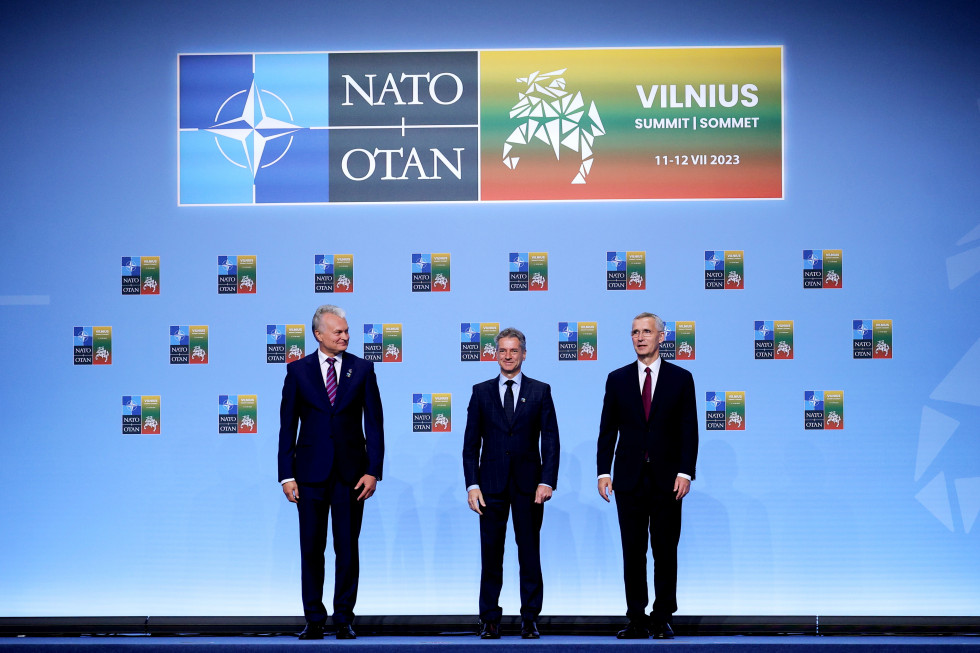Prime Minister Golob at the NATO summit in Vilnius with the Deputy Prime Minister and Minister of Defence

Prime Minister Golob at the NATO summit in Vilnius with the Deputy Prime Minister and Minister of Defence | Author Daniel Novakovič/STA
The focus of this summit is further support for Ukraine and the enhancement of the Alliance’s defence and deterrence capacities. Prior to the session, Prime Minister Golob commended the progress attained just before the summit relating to Sweden’s accession to NATO. The country will join the Alliance as the 32nd member after Finland. The Prime Minister highlighted that NATO has responded to the changed security situation by strengthening its defence and deterrence stance. According to him, Slovenia’s membership in the North Atlantic Alliance should also be understood in this light, "We want to be part of the international community in order to deter anyone from thinking that military force is a way of resolving inter-state relations." Slovenia supports the acceleration of NATO’s digital transformation, including the development of regional plans. "I believe that NATO will be stronger and more united after this summit on the one hand, and on the other, that this will also denote greater security in the world," added Prime Minister Golob.
Slovenia supports the commitments to increase defence expenditure to at least two per cent of GDP, whereby it strives for a balanced, realistic and credible approach. According to the Prime Minister, Slovenia is aware that the path will not be easy, but the country could reach this target by 2030. He further noted the "objective obstacle" of the new EU fiscal rules. "I am certain that if the increase of defence expenditure is not addressed accordingly in the fiscal rules, then Slovenia and the majority of other European countries will have great difficulties in attaining this target," he said.
The inaugural meeting of the NATO-Ukraine Council will also be held within the framework of this summit, and it represents an important upgrade of political cooperation with Ukraine. Prime Minister Golob emphasised that by abolishing the membership action plan, the dynamics of Ukraine’s accession was also changing, whereby he reiterated that it was first necessary "to seek a path to lasting peace and only once lasting peace is ensured will the conditions arise in which to discuss Ukraine’s membership in NATO." Non-military aid provided by NATO to Ukraine is of the utmost importance. Slovenia has been very active in contributing its share and it will continue to do so in the future.
On the first day of the summit, Prime Minister Golob met the President of the Republic of Finland, Sauli Niinistö. The Prime Minister expressed Slovenia’s satisfaction with Finland’s active engagement in the Western Balkans, as it participates with a contingent of 70 soldiers in the KFOR operation. He stressed the significance attributed by Slovenia to its membership in the European Centre of Excellence for Countering Hybrid Threats in Helsinki in the light of contemporary security challenges. In the spring of 2024, Slovenia will host the meeting of the Centre’s Steering Board. Prime Minister Golob also commended the decision of the Finnair airline to reinstate the Helsinki–Ljubljana flight connection in the summer of 2023 and expressed the desire to retain the connection in the future.
The Minister of Foreign and European Affairs, Tanja Fajon, is attending the informal meeting of foreign ministers of the North Atlantic Council together with the foreign ministers of Bosnia and Herzegovina, Georgia and Moldova, and the EU High Representative for Foreign Affairs and Security Policy, Josep Borrell. Minister Fajon advocates further solidarity and the strengthening of political cooperation with vulnerable partners such as Georgia and Moldova that have been affected by the Russian aggression against Ukraine, and the Western Balkans. "Security in, and the stability of, our partner countries must be in our strategic interest. Which is why we must listen to them and help them enhance their resilience," highlighted the Minister, adding that the Western Balkans was a region of strategic importance and critical for the security and stability of the Euro-Atlantic area.
On the margins of the NATO summit, Minister Fajon met the Deputy Prime Minister and the Minister of Foreign Affairs and European Integration of the Republic of Moldova, Nicu Popescu, with whom she spoke about the security situation in the country and region. The Slovenian Minister expressed support for Moldova’s European perspective.
The Minister of Defence, Marjan Šarec, will attend the informal meeting of the North Atlantic Council at the level of the Ministers of Defence. The latter will address the key activities linked to the strengthening of deterrence and defence, including regional plans.

